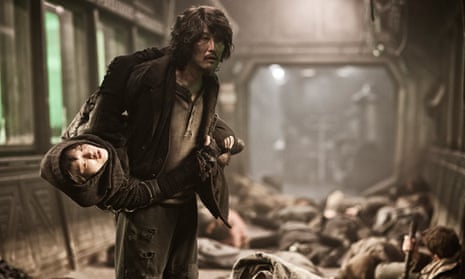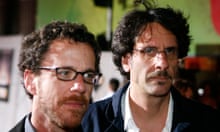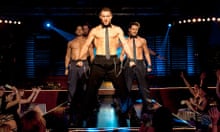Snowpiercer chugs into Edinburgh carrying quite a bit of baggage: a contentious re-edit by Harvey Weinstein à la Grace of Monaco, the burden of previous English language flops by other Korean directors (Stoker, The Last Stand); and a daft-sounding premise involving a giant allegorical train that goes over tired ground covered by Elysium and District 9. However, I can report that Snowpiercer works brilliantly, the sum of extremely disparate parts that adds up to cinematic excellence.
The base material is a French graphic novel called Le Transperceneige; the director and co-writer is Bong Joon-ho, best known for the South Korean monster movie The Host; the cast is a multi-ethnic collection including Chris "Captain America" Evans, Korean star Song Kang-ho, Academy award-winner Octavia Spencer and the UK's own Tilda Swinton, John Hurt and Jamie Bell. The premise is indeed daft: after a "second ice age", all human survivors have retreated from the frozen planet inside an enormous train, which is divided on strict class principles. We start off right at the back, among the unwashed proletariat, where revolution is being fomented by Curtis Everett (Evans) and his loyal sidekick Edgar (Bell); their immediate target is to get through the gates to the next set of carriages, which are protected by brutal, gun-wielding guards.
In its constricted, surreal conception, there's something of absurdist theatre about Snowpiercer, though developed to grotesque extremes – as if Terry Gilliam or Michel Gondry had been hired to rewrite Samuel Beckett. And in the absolutely straight-faced way the inhabitants of this bizarre environment respond to it, it betrays the influence of recent Korean cinema – another of whose pre-eminent practitioners, Park Chan-wook, has a producer credit. It looks wonderful too: the exterior shots of the train barrelling its way through the ice-bound landscape are superbly realised, and each carriage – from the in-car aquarium to the strobe-and-mirrorball nightclub – is a beautifully detailed miniature.
But it's the strength of purpose that carries this film through, for all its wonderful design. Each carriage forward represents a new struggle for Evans' Curtis, with Song's "security expert" and gate-opener along for the ride with his wide-eyed daughter Yona (Go Ah-sung). Among their opponents are Vlad Ivanov (from 4 Months, 3 Weeks and 2 Days) playing a near-indestructible killer, and Swinton, who plays the elite passengers' mouthpiece as a cross between Deirdre Barlow and Margaret Thatcher – another in her gallery of extraordinary cameos. The way the allegory works out is not exactly subtle or unexpected, but is strangely moving, despite the gruesomeness that has gone before. All in all, a treat.




Comments (…)
Sign in or create your Guardian account to join the discussion